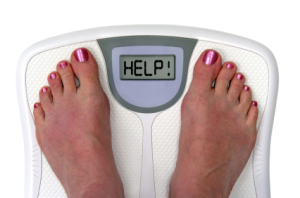 It’s well known that drastic weight loss slows your metabolism and has an adverse impact on your thyroid gland. But a new study shows that even modest weight loss affects thyroid hormone activity in your body–which could make it harder to continue to lose weight or even set you up for regaining and then some.
It’s well known that drastic weight loss slows your metabolism and has an adverse impact on your thyroid gland. But a new study shows that even modest weight loss affects thyroid hormone activity in your body–which could make it harder to continue to lose weight or even set you up for regaining and then some.
The study, by researchers at the National Institutes of Health, found that overweight people who lost 5 – 10 % of their body weight over the course of a year had a corresponding decrease in serum T3 levels. T3 is the body’s “active” form of thyroid hormone and it is what drives metabolism. T4 needs to be converted to T3 to become active.
Notably, in this study, there was no significant change in Thyroid Stimulating Hormone (TSH) or free T4. That means that this drop in hormone activity would not be apparent in standard thyroid hormone blood tests. Your tests would appear normal, because the drop in thyroid activity was not due to decreased production of T4 in the thyroid gland but of T4 to T3 conversion. In fact, the researchers say: “The data suggest that a decrease in peripheral conversion of the pro-hormone T4 into its hormonally active metabolite T3 is at least in part responsible for the changes in thyroid hormone homeostasis.”
What’s this mean for you, if you’re trying to lose weight? Well, you could have the same experience as the people in this study. Your initial weight loss could lead to slowed metabolism due to reduced conversion of T4 to T3. You might feel lousy and frustrated about your stalled weight loss, but your doctor will say “It’s not your thyroid.”
An easy way to find out if your metabolism really has slowed down is to see if your body temperature is consistently low, typically below 97.8 F. Some people’s temperatures can drop even when their thyroid blood tests are completely normal, and even when they feel hot. This is known as Wilson’s Temperature Syndrome. People with Wilsons Temperature Syndrome often recover completely when their temperatures are returned to normal with a special thyroid hormone protocol and their symptoms often remain improved even after the treatment has been discontinued.
For the most accurate results, use a liquid metal thermometer, take it three times a day, starting three hours after you wake up, for several days, and average the temperature for each day.
If your body temperature is consistently low, you can discuss taking a course of T3 (active thyroid hormone) with your doctor. Then, take your body temperature every day during treatment. You’ll be looking for oral body temperatures that average 98.6 with treatment. (See “How are body temperatures measured” for complete instructions.)
Many people who are treated adequately with T3, alone or in combination with T4, see that they can lose weight and keep it off. They still have to work at it, but it takes less effort and offers greater reward. They often have more energy and better mood, a big plus when you are dieting.
References:
Agnihothri RV, Courville AB, Linderman JD, et al. Moderate weight loss is sufficient to affect thyroid hormone homeostasis and inhibit its peripheral conversion. Thyroid. 2013 Jul 31.

Interesting n informative
Thank you
I fasted for 21 days on just water and my temperature plummeted to 94.6. Would there be any protocol available to keep the temperature up while fasting or on a reduced calorie diet. What if one was to add T-3? Any suggestions?
Yes, T3 can usually keep the temperature normal during fasting.